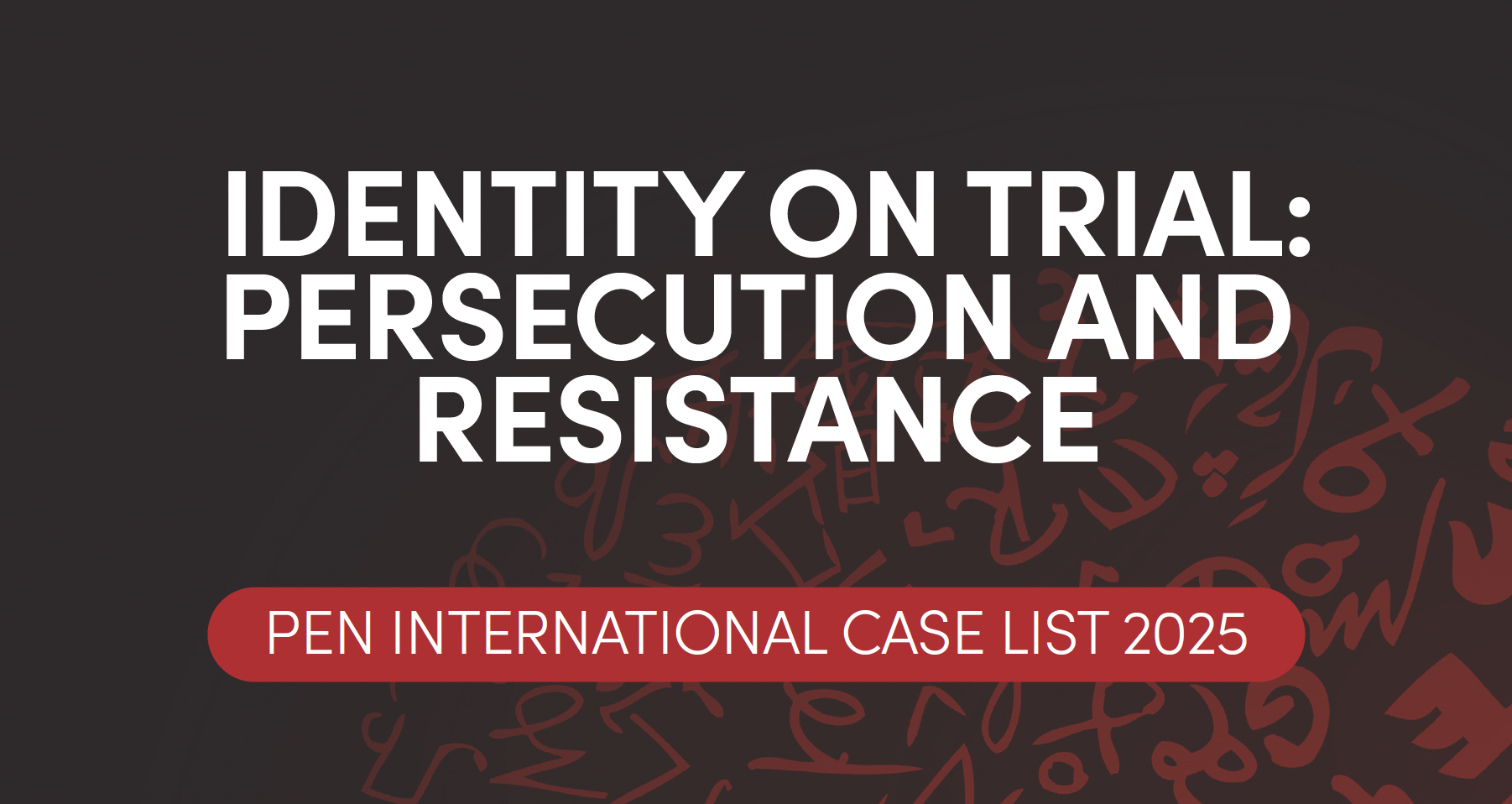Identity on Trial: Persecution and Resistance – PEN International Case List 2025
“As the very principles of international human rights and humanitarian law are being increasingly questioned by governments worldwide, we must redouble our efforts, defending the values that unite us: freedom, justice, and equality.” Ma Thida, Chair of PEN International’s Writers in Prison Committee.
21 March 2025: PEN International is proud to launch Identity on Trial: Persecution and Resistance – its Case List 2025, which highlights the increasing persecution of writers based on their identity. This year’s report documents the alarming rise in censorship, imprisonment, and threats faced by writers due to their gender, sexual orientation, ethnicity, or religious beliefs. It underscores a disturbing global trend: those who dare express their identity or challenge dominant narratives are being silenced through legal threats, censorship, and violence.
A rising trend: Persecution based on identity
While women represented 29% of the writers featured in this year’s Case List, they were more likely to face legal trials, censorship, and harassment. The suppression of women’s rights in Afghanistan has reached harrowing levels. The Taliban’s return to power has resulted in the brutal erasure of women and girls from public life, imposing an apartheid-like system that systematically denies them education, employment, and cultural participation.
Indigenous writers in the Americas, including Canada and Mexico, faced mounting threats, while ethnic minorities in China, Türkiye, and beyond suffered persecution for their activism and cultural expression. Uyghur and Tibetan writers, for instance, continued to be handed lengthy prison sentences, including Uyghur professor Ilham Tohti, who is serving life in prison for advocating for his community’s rights. In Türkiye, Kurdish writer Yavuz Ekinci faced more than seven years in prison on baseless terrorism charges linked to his novel Dream Divided, which remains banned in the country.
Book bans and censorship: Erasing marginalised voices
One of the most alarming trends in our Case List 2025 has been the rise in book bans. Authorities worldwide are restricting access to works that discuss sexual violence, LGBTQI narratives, and racial issues—erasing critical perspectives from public discourse.
In the United States, more than 10,000 instances of book bans were recorded during the 2023-2024 school year. In Argentina, censorship is increasingly targeting works by women, while in Hungary and the Russian Federation, LGBTQI-themed books are being removed from shelves, with publishers facing fines and intimidation.
War and conflict: Silencing critical voices
The suppression of free expression is deeply intertwined with war, conflict, and the persecution of marginalised voices, with writers, journalists, and cultural figures often targeted for their identities, resistance, and words. PEN International continues to document these threats in countries such as:
Ukraine: Since the Russian Federation launched its full-scale invasion in 2022, Russian forces have deliberately targeted Ukraine’s cultural heritage, with UNESCO verifying damage to 476 sites. Journalist Viktoria Roshchyna reportedly died in custody in September 2024 in the Russian Federation. Authorities provided no information about her death.
Palestine: Israel’s relentless bombing of Gaza has devastated cultural and media institutions. More than 45,000 Palestinians have been killed, including at least 23 writers, according to PEN International’s research. Schools, universities, libraries, and bookshops have been obliterated, effectively cutting off generations from education and cultural participation.
Sudan and Ethiopia: The ongoing conflicts in both countries have led to mass killings, sexual violence, and widespread attacks on the press. PEN International has received a sharp increase in emergency assistance requests from writers and journalists in these regions.
Emergency Support for Writers at Risk
Identity on Trial: Persecution and Resistance – PEN International Case List 2025, highlights the grave risks writers face worldwide. In 2024, PEN International issued 85 emergency grants—a 17% rise from 2023—for relocation, medical aid, and living expenses.
Most grants supported Palestinian writers fleeing Gaza (13), followed by those in Afghanistan (11) – 4 of which went to women writers facing gender-based violence from the Taliban authorities- and Myanmar (9).
Recommendations
PEN International makes the following recommendations to the international community:
To foster just peace, end all armed conflicts, protect civilians and cultural heritage.
To promote and protect writers, including women writers and those from minoritised communities, and uphold free expression.
To protect civic space as a foundation for human rights and democracy, while countering authoritarianism and censorship.
PEN International remains committed to its advocacy and campaigns in 2025 and beyond, working to put an end to attacks on freedom of expression, enhance protection and refuge systems for writers so they can continue their crucial work, and demand accountability and justice for the harm suffered.
Take Action for Mahvash Sabet
This year, on World Poetry Day, PEN International highlights the case of Mahvash Sabet, an Iranian poet and member of the persecuted Baha’i minority, who is serving a 10-year prison sentence on unfounded charges of espionage linked to her religious beliefs. Sabet, who wrote poetry while imprisoned, represents the countless voices that authoritarian governments seek to erase. We urge the international community to stand with her and demand her immediate and unconditional release.
Note to editors:
For further information, please contact Aurélia Dondo, PEN International Head of Europe and Central Asia: [email protected]
For media queries, please contact Sabrina Tucci, PEN International Communications and Campaigns Manager, [email protected]

